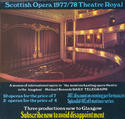 The musicologist and historian Henry George Farmer's work continued with the setting up of The Scottish Music Archive in 1969, now The Scottish Music Information Centre. It holds the world's largest collection of Scottish music in publications, manuscripts, audio and reference library.
The musicologist and historian Henry George Farmer's work continued with the setting up of The Scottish Music Archive in 1969, now The Scottish Music Information Centre. It holds the world's largest collection of Scottish music in publications, manuscripts, audio and reference library.
 Scottish Opera was founded in 1962, later to be joined by Scottish Ballet. The BBC (British Broadcasting Corporation) expanded its orchestra to symphonic size and the Scottish National Orchestra was put on a permanent footing and appointed its first Scottish conductor, Sir Alexander Gibson. The Traditional Music Association, the Glasgow Piping Centre and other such bodies were established and a degree course in Scottish Traditional Music was inaugurated at the Royal Scottish Academy of Music and Drama.
Scottish Opera was founded in 1962, later to be joined by Scottish Ballet. The BBC (British Broadcasting Corporation) expanded its orchestra to symphonic size and the Scottish National Orchestra was put on a permanent footing and appointed its first Scottish conductor, Sir Alexander Gibson. The Traditional Music Association, the Glasgow Piping Centre and other such bodies were established and a degree course in Scottish Traditional Music was inaugurated at the Royal Scottish Academy of Music and Drama.
 The new music series "Musica Viva" gave British Premiers of Schoenberg's Violin Concerto and Stockhausen's Gruppen as well as works by Glaswegians Thomas Wilson (1927-2001) and Iain Hamilton (1922-2000), but the loss of the St Andrew's Hall put paid to adventure in programming for a decade. The hall had one of the finest acoustics in the world, but has now been replaced by the Glasgow Royal Concert Hall. In 1971 "Musica Nova" was started and the Glaswegian James Dillon (b.1950) was one of the first Scottish composers to be featured. Other leading Glasgow composers include John Geddes (b.1941), Edward McGuire (b.1948), film music composer Craig Armstrong (b.1958), William Sweeney (b.1950) and the internationally renowned James McMillan (b.1959).
The new music series "Musica Viva" gave British Premiers of Schoenberg's Violin Concerto and Stockhausen's Gruppen as well as works by Glaswegians Thomas Wilson (1927-2001) and Iain Hamilton (1922-2000), but the loss of the St Andrew's Hall put paid to adventure in programming for a decade. The hall had one of the finest acoustics in the world, but has now been replaced by the Glasgow Royal Concert Hall. In 1971 "Musica Nova" was started and the Glaswegian James Dillon (b.1950) was one of the first Scottish composers to be featured. Other leading Glasgow composers include John Geddes (b.1941), Edward McGuire (b.1948), film music composer Craig Armstrong (b.1958), William Sweeney (b.1950) and the internationally renowned James McMillan (b.1959).
Lulu (b.1948) burst on to the scene with Shout in 1964, the first Scottish hit of the Beat era. A thriving pop music scene has since given rise to such groups as Simple Minds, Blue Nile, Wet Wet Wet, Deacon Blue, Orange Juice and Teenage Fanclub.